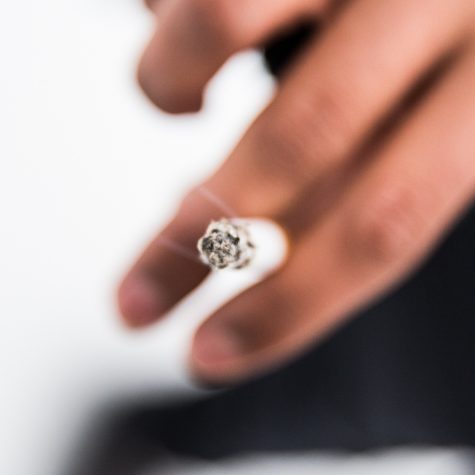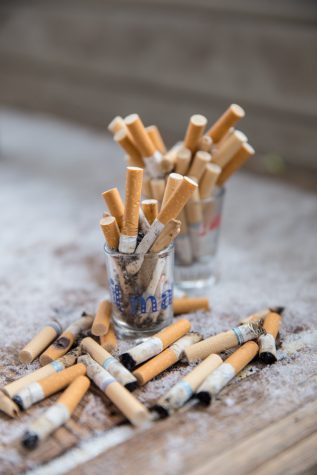Tobacco 21: Washington considers raising the minimum smoking age
February 9, 2017
Go to any Whitman party and you will see students enjoying a cigarette on the front steps. Walk into the library and you will pass through a cloud of smoke coming from the benches outside. There is no doubt that Whitman has a smoking culture, but will this soon change? The Washington State legislature is hearing a bill, commonly known as Tobacco 21, that proposes to raise the legal tobacco age to 21 across the state. Two other states, California and Hawai’i, currently have similar legislation. Tobacco 21 will apply to cigarettes, vaping, chewing tobacco and any other tobacco-based products. The initiative is spearheaded by the state Department of Health and Attorney General.
“By raising the age to 21, we are trying to protect the 15, 16, 17 year olds from ever getting addicted to nicotine so we can have the healthiest next generation,” Washington Secretary of Health John Weisman, DrPH, MPH said. According to Weisman, the Department of Health has been working to reduce the number of minors who use tobacco for several years. While the number of minors who use cigarettes has not increased, alternative forms of tobacco use, such as vaping, are on the rise.
“Our concern is that we have sort of stalled out in reducing combustible tobacco use down around eight percent of tenth graders, which is a great improvement, but we knew we needed to do more,” Weisman said. “The next logical thing was to squeeze the pipeline of access for 15-17 year olds because we know that 75 percent of them are getting tobacco from 18-20 year olds.”
Though the Tobacco 21 Bill is designed to cut off tobacco access for middle and high school students, it will also affect Whitman students under the age of 21.

Junior philosophy major Nolan Bishop bought his first pack of cigarettes at age 18. For him, smoking is a social activity.
“At Whitman, obviously smoking isn’t good for any of us, but it can be really good for me in a social sense because it is an easy way to strike up a conversation with anyone,” Bishop said. “I think for a lot of people it is built into their academic routine. Like, I’ll come to the library, do an hour and a half or two of work, then go smoke a cigarette, then do another hour and a half or two hours of work. And I think that’s the case for a lot of people who you see smoking outside of the library.”
However, Bishop thinks the Tobacco 21 plan may not be effective on a campus where 18-20 year olds readily have access to older students who can purchase tobacco for them.
“I’m a little skeptical of how much this will do to reduce smoking rates among young people,” Bishop said. Bishop compared tobacco to how students gain access to alcohol. “Right now you have to ask your older friends to buy beer for you if you are under the age of 21, obviously that’s a thing. Cigarettes will just end up on that list of things you can’t buy before the age of 21, but you nevertheless can find a way to get your hands on it.”
Senior biochemistry, biophysics and molecular biology major Mathias Palmer serves as Whitman’s President of Pre-Health Society. Palmer also does not believe that the plan will be effective on campus.
“The legislation to move it from 18 to 21–I think is a ridiculous waste of money and time … People are going to be able to get cigarettes from those who are over 21. I don’t think the age change will make any difference on that,” Palmer said. He believes that this plan will not curb the number of students using tobacco.
“The problem isn’t education. I think that smoking is something that is a cultural thing, not a legal thing. So arguing about the age of someone who buys cigarettes, sure, that restricts access for some younger students, but that doesn’t solve the root of the problem,” Palmer said.
Though they are skeptical about how effective the Tobacco 21 will be on college campuses, Palmer and Bishop both think that it is important to try to reduce access for high school students.

“Generally, I think [Tobacco 21 is] a good idea probably … If [the legal age] had been 21 [in Massachusetts at the time], I wouldn’t have been able to buy my first pack of cigarettes,” Bishop said.
Palmer thinks that Whitman as a whole should engage in more discussions about the smoking culture, questioning its presence on campus. “Why is it that we, at a college where we promote health activities, eating right, exercising freedom of choice, that we see people who are smoking and no one is having a conversation about that?”
Weisman believes that the largest effect that the Tobacco 21 plan will be in the incoming student population.
“From a college campus perspective, we are bringing in a student body that is healthier,” Weisman said. “We are also delaying the onset of experimentation with tobacco products to a time when people can make more reasoned choices.”
There are some resources available in the Walla Walla community to support those who are trying to overcome nicotine addiction. Students currently addicted to nicotine who want to work with a professional can work with the Counseling Center to connect with social support groups in Walla Walla.






